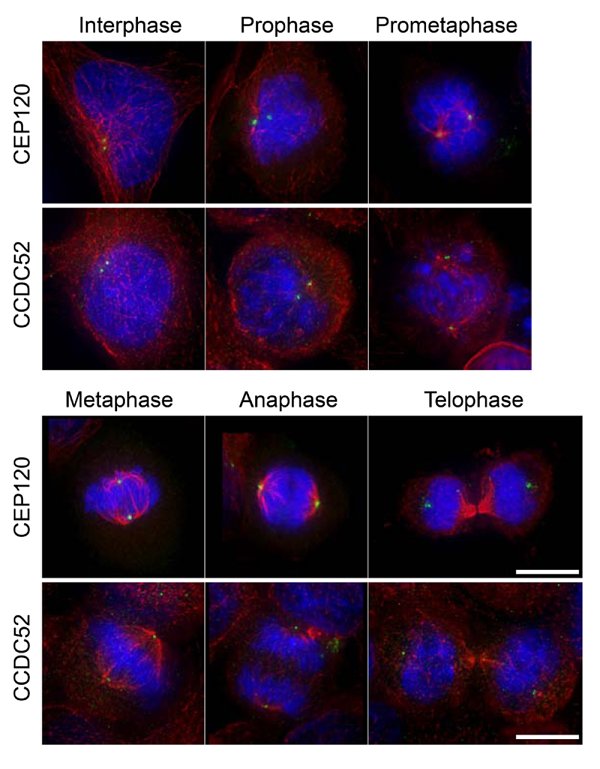Proteins at the heart of life

A new study uses high-throughput systems to understand the functions of proteins involved in a most fundamental aspect of life; cell division. The work identified more than 100 proteins as being involved in this process, of which one in three had no previously known role in cell division.
The results, founded on the gene predictions made by the Ensembl joint project between the Sanger Institute and the European Bioinformatics Institute, show the power of such high-throughput methods to reveal the role of proteins in cell function. The complex process of cell division lies at the heart of life and is central to cancer biology.
The team identified almost 700 proteins to study from previous work on cell division – mitosis – as well as emerging results from a companion study published on 1 April in Nature. They refined this first group to 104 strong candidates for the high-throughput analysis of their behaviour – where they were found in the cell and what other proteins they associated with. What proteins worked in partnership in mitosis?
“Through an innovative European collaboration in functional genomics, we have brought large-scale experimental strategies to bear on a key component of basic biology: how cells manage the doubling of their DNA when they divide. Such projects to study gene function systematically based on the genome sequence all have a core component of bioinformatics, the computer-based management and processing of biological data.
“When we set out to sequence the human genome, one of the visions was that complex processes such as mitosis might be understood using genome-scale research. This study is a great example of how that vision has become real.”
Dr Richard Durbin from the Wellcome Trust Sanger Institute
The MitoCheck consortium (www.mitocheck.org) developed a fast and reliable procedure for the introduction of tagged genes into human cells grown in the lab, where their activity corresponds to that of the native gene. In this study, the team looked at the role of just over 100 of the tagged proteins in mitosis.
The search picked put previously undetected components of known protein ‘machines’ that work in mitosis. The team have been able to identify previously unknown protein complexes, new subunits of well-studied protein complexes, and unknown interactions between known proteins. However, the majority of the results have not yet been used for follow-up experiments. The authors believe that such experiments will lead to additional important discoveries about the functions of human protein complexes in mitosis.The methods they have developed will provide systems-scale approaches to studying protein function, helping to capitalize on the results of human genetic and genomic studies, which often identify many uncharacterized proteins potentially associated with disease.
More information
Data availability
Data are available from the Mitocheck consortium as a resource to the community at http://www.mitocheck.org
Funding
This work was funded principally by the European Commission via the Sixth Framework Programme Integrated Project ‘MitoCheck’. Individual research teams were supported by Boehringer Ingelheim, the Vienna Spots of Excellence Programme, the Austrian Science Fund Special Research Programme Chromosome Dynamics and the Genome Research in Austria Programme, the Natural Science and Engineering Research Council and the National Cancer Institute of Canada, the Human Frontier Science Program and the Wellcome Trust.
Participating centres
- Research Institute of Molecular Pathology, Vienna, Austria
- Max Planck Institute for Molecular Cell Biology and Genetics, Dresden, Germany
- Wellcome Trust Sanger Institute, Wellcome Trust Genome Campus, Hinxton, Cambridge, UK
- Cell Biology and Biophysics Unit, European Molecular Biology Laboratory,Heidelberg, Germany
- Samuel Lunenfeld Research Institute, Mount Sinai Hospital, Toronto, Ontario, Canada
- Department of Molecular Genetics, University of Toronto, Toronto, Ontario, Canada
- German Cancer Research Center, Heidelberg, Germany
- Max Planck Institute for Biophysical Chemistry, Gottingen, Germany
Publications:
Selected websites
The Wellcome Trust Sanger Institute
The Wellcome Trust Sanger Institute, which receives the majority of its funding from the Wellcome Trust, was founded in 1992. The Institute is responsible for the completion of the sequence of approximately one-third of the human genome as well as genomes of model organisms and more than 90 pathogen genomes. In October 2006, new funding was awarded by the Wellcome Trust to exploit the wealth of genome data now available to answer important questions about health and disease.
The Wellcome Trust
The Wellcome Trust is a global charitable foundation dedicated to achieving extraordinary improvements in human and animal health. We support the brightest minds in biomedical research and the medical humanities. Our breadth of support includes public engagement, education and the application of research to improve health. We are independent of both political and commercial interests.


